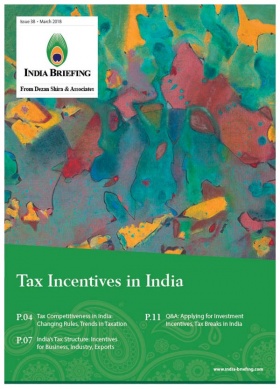US Exports to India Face Higher Tariffs after Trump Government Withdraws Concessions
Editor’s note: The Indian government has postponed the execution of its retaliatory tariff on US imports until further notice.
On June 20, India’s Central Board of Indirect Taxes and Customs announced an increase in the basic customs duty (BCD) on select products imported from the US.
The increase in duties is an outcome of ongoing international trade tensions due to aggressive posturing by the US Trump presidency, and is not reflective of a protectionist agenda by India.
Assistant US trade representative Mark Linscott will be visiting India on June 26 to address irritants in the bilateral trade relationship.
Select US products to face higher tariffs
30 products will be subject to raised tariffs, ranging from 20 to 50 percent.
These include almonds (20 percent), walnuts (20 percent), apples (25 percent), and motor cycles with engine capacity over 800 cc (50 percent).
Previously, India had proposed increasing tariffs by up to 100 percent on certain products.
According to Notification 48/2018 and 49/2018, goods that fall under the following classifications will be liable to a higher BCD from June:
- Chapter 05 (Artemia);
- Chapter 07 (edible vegetables and certain roots and tubers);
- Chapter 08 (edible fruits and nuts);
- Chapter 28 (inorganic chemicals);
- Chapter 38 (miscellaneous chemical products);
- Chapter 72 (iron and steel); and,
- Chapter 73 (articles of iron and steel).
Trade tensions begin as US withdraws concessions
This is the first time India has levied retaliatory tariffs on any country.
The increase in custom tariffs were issued under Section 8A of the Customs Tariff Act, 1975, which facilitates immediate action under necessary circumstances.
In March this year, the US government suspended its concessions on imports of certain steel articles and aluminum, including from India.
This meant the imposition of an additional tariff of 25 percent on steel and 10 percent on aluminum imports. The US cited reasons of national security.
India, meanwhile, says its new trade measures will be equivalent to the amount affected by the US, and expects to recoup around US$238.09 million of duty.
The European Union (EU) and China have joined India in levying retaliatory tariffs; all are impacted by the US withdrawal of trade concessions – leading to a potential trade war in the making.
An all-out trade war may impact up to 10 million US jobs, which depend on the export of goods and services as higher tariffs escalate production costs, reducing the profit making and investment bandwidth of US companies.
Already, the motorcycle maker Harley Davidson has ‘waved the white flag’ as tweeted by President Trump.
Retaliatory tariffs by the EU will cost the iconic American company as much as US$100 million and raise the unit price of a motorcycle export by US$2,200.
Harley Davidson is now exploring the relocation of manufacturing plants to the EU to offset the higher costs of selling units offshore.
US demands India roll-back subsidies and sector-based benefits
In addition to higher trade tariffs in the US, the Trump government has moved the World Trade Organization (WTO) to get India to roll-back its export promotion schemes, stating its harm on American workers.
The subsidy schemes are critical to the growth of industry and investment in India and include – the export-oriented units scheme and sector-specific schemes, such as the electronics hardware technology parks scheme, merchandise exports from India scheme, export promotion capital goods scheme, special economic zones, and duty-free import authorization scheme.
The US alleges that India’s exemption under the WTO’s special and differential provisions for developing countries expired in 2015.
Under existing WTO rules, a country must withdraw export subsidies if its per-capita gross national income or GNI has crossed US$1,000 for three years in a row, which it did between 2013 and 2015.
A panel has been formed in the WTO to examine India’s export-related measures and will circulate its report to all WTO members within 90 days of the date of its composition.
If India is found to be violating its WTO commitments, the country will need to end its subsidies immediately.
About Us
India Briefing is published by Asia Briefing, a subsidiary of Dezan Shira & Associates. We produce material for foreign investors throughout Eurasia, including ASEAN, China, Indonesia, Russia, the Silk Road, & Vietnam. For editorial matters please contact us here and for a complimentary subscription to our products, please click here.
Dezan Shira & Associates provide business intelligence, due diligence, legal, tax and advisory services throughout India and the Asian region. We maintain offices in Delhi and Mumbai and throughout China, South-East Asia, India, and Russia. For assistance with India investment issues or into Asia overall, please contact us at india@dezshira.com or visit us at www.dezshira.com.
- Previous Article Investing in India’s Higher Education Sector
- Next Article The Sports Industry in India – Investment Prospects in Manufacturing, Retail, and Training










